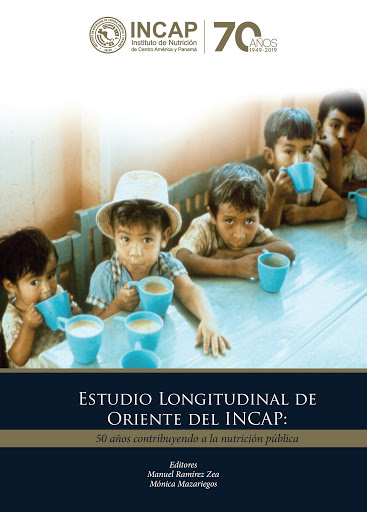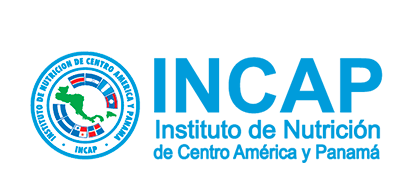INCAP presents
Longitudinal Study of the East
Guaatemala City, Septiembre 4, 2019

In the framework of its 70th Anniversary, the Institute of Nutrition of Central America and Panama –INCAP-, presented the book "Longitudinal Study of the East of INCAP, 50 years contributing to public nutrition."
INCAP was founded in the Central American region 70 years ago to contribute with its member countries, and humanity, to the technical scientific development in nutrition and health, as well as provide evidence about how to contribute to the solution of nutritional and health problems that affect them.
This book summarizes the outstanding results of INCAP's Longitudinal Study of the East. The unique cohort in this study is the longest followed from birth in a developing country. To date, this study has had 7 important follow-ups over 50 years, which has generated strong and consistent evidence to address past and present nutritional problems.
During 50 years at INCAP, he followed the growth and development of these children until adulthood, the results demonstrate the importance of good food and nutrition during the first years of life.
For the elaboration of the commemorative book, 12 prestigious international researchers contributed their skills, knowledge and experience at some point to INCAP's Longitudinal Study of the East. In addition, five researchers in training who participated in the latest follow-ups and two researchers from the World Bank were included to obtain an external perspective on the contribution of this study to public health and nutrition at a global level.
Having a book that presents the most robust and up-to-date scientific evidence on nutrition early in life and its consequences in adult life will allow for more effective advocacy for decision-making by the authorities who are responsible for formulating the health and nutrition policies, and budgeting the financial resources necessary to ensure the financing of these policies.
About the Longitudinal Study of the East of INCAP 1969 – 1977
The Longitudinal Study of the Institute of Nutrition of Central America and Panama (INCAP) in the East of Guatemala (ELIO), which began 50 years ago, and which between 1969 and 1977, carried out a nutritional intervention of growth and development in 2392 children under 7 years old, born between 1962 and 1977, pregnant and lactating women in 4 rural communities of the department of El Progreso.
During the study, a protein-rich supplement (atole) was provided that consisted of a mixture of vegetables, (created in 1956 by Dr. Ricardo Bressani and her team), skim milk and energy (sugar) distributed as a hot drink (atole) in two villages, and a flavoring drink without protein, energy or vitamins, which consisted of flavorings and sugar (soft drink), distributed in the other two villages.
Consumption was carefully recorded for each child under 7 years of age and for all pregnant or lactating women. Subjects initially received one cup of supplement (180 ml), although additional cups were provided on request. It should be noted that most of the children in the communities were below the reference growth measures of the World Health Organization (WHO). Diarrheal and respiratory infections were frequent causes of morbidity.
The study generated one of the best sources of data, it was shown that better nutrition during pregnancy and the first years of life, more medical care, produces a positive influence on the physical growth and mental development of children. Among these results, it stands out that the nutritional intervention benefited the children in many ways, improving their weight at birth; Infant mortality rates were markedly reduced compared to rates from 1949 to 1968, infant mortality from 1969 to 1977 decreased by 66% in villages that consumed atole, compared to 24% and 19% in villages. villages that received fresh, not intervened.
In 1988-1989, the study focused on the impact of nutritional supplementation in the first three years on the subjects when they were adolescents and in the critical period of gestation and on the formation of human capital. The results showed that adolescents who were exposed to atole during the first three years of life were taller and had a greater fat-free mass than those who received soda. In addition, the performance of children who were exposed to supplements during pregnancy was evidenced, demonstrating positive effects on early maturation, intellectual functioning and school achievement, versus those exposed to a supplement later in life.
During 1991 to 1999, the follow-up was extended to pregnant women supplemented during their childhood. The indicators of nutrition, functional competence and intellectual functioning of the mother and mother-child interaction, showed that the benefits found in early childhood persist into adulthood.
Between 2001 and 2004, the benefits of the impact of nutrition during different stages of life (fetal, infancy and childhood) on the formation of human capital (academic achievement, intellectual functioning, body size and composition and mental health achieved in the adulthood), as well as economic productivity. During 2005 to 2007, the dynamics of early nutrition, economic productivity, and aid transfers from adults to their parents and children were studied.
During 2014 to 2017, a follow-up was carried out: nutrition in childhood and cardiometabolic and metabolomic profile in adult life. The objective is to test the hypothesis that improving early nutrition can attenuate the development of cardiometabolic risk in Guatemala. In the period 2017 to 2019, a follow-up phase of the Study is carried out, now that the subjects are men and women between 40 and 55 years of age. The objective is to understand the events related to nutrition in early childhood on the cognitive abilities of the subjects, the formation of social and human capital. This study will allow to link the nutrition data in early childhood, with the data of the current follow-up, which involves a follow-up 50 years later.
You can obtain the book by contacting the INCAP Library at (502) 2440-9862. Mail: This email address is being protected from spambots. You need JavaScript enabled to view it.
















